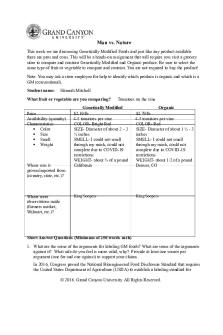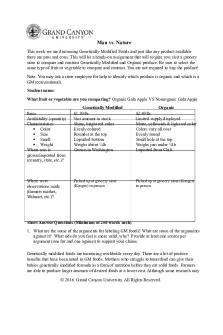Man vs Nature PDF

| Title | Man vs Nature |
|---|---|
| Course | Environmental Science |
| Institution | Grand Canyon University |
| Pages | 3 |
| File Size | 157.9 KB |
| File Type | |
| Total Downloads | 2 |
| Total Views | 165 |
Summary
Organic vs GMO produce comparison ...
Description
Man vs. Nature This week we are discussing Genetically Modified Foods and just like any product available there are pros and cons. This will be a hands-on assignment that will require you visit a grocery store to compare and contrast Genetically Modified and Organic produce. Be sure to select the same type of fruit or vegetable to compare and contrast. You are not required to buy the product! Note: You may ask a store employee for help to identify which produce is organic and which is a GM (conventional). Student name:
Hannah Mitchell
What fruit or vegetable are you comparing? Price Availability (quantity) Characteristics: Color Size Smell Weight
Where was it grown/imported from (country, state, etc.)?
Where were observations made (farmers market, Walmart, etc.)?
Tomatoes on the vine
Genetically Modified $2.19/lb 4-5 tomatoes per vine COLOR- Bright Red SIZE- Diameter of about 2 – 3 ½ inches SMELL- I could not smell through my mask, could not complete due to COVID-19 restrictions WEIGHT- about ¾ of a pound California
Organic $2.79/lb 4-5 tomatoes per vine COLOR- Red SIZE- Diameter of about 1 ½ - 3 inches SMELL- I could not smell through my mask, could not complete due to COVID-19 restrictions WEIGHT- about 1/2 of a pound Denver, CO
King Soopers
King Soopers
Short Answer Questions (Minimum of 250 words each) 1. What are the some of the arguments for labeling GM foods? What are some of the arguments against it? What side do you feel is more valid, why? Provide at least one source per argument (one for and one against) to support your claims. In 2016, Congress passed the National Bioengineered Food Disclosure Standard that requires the United States Department of Agriculture (USDA) to establish a labeling standard for © 2016. Grand Canyon University. All Rights Reserved.
genetically modified food and requires food companies to comply by January 1, 2022 (“Everything you need”, 2020). The topic of labeling GMO products in the United States has been debated for years, but regardless it is estimated that GMOs were present in 70% to 75% of conventional processed food on supermarket shelves, according to a 2003 Study done by The Grocery Manufacturers Association (Fergusson, 2020). Groups that are for labeling GMO products argue that most people want the right to choose what they eat and what they feed their families and are unable to accurately do so without properly labeling the product’s contents. The opposing side argues that labeling requirements are appropriate when there is undisputed scientific evidence that a food component is damaging, but “a recent NRC report states that GMOs are as safe if not more safe than conventional food which is also consistent with most of the published research” (Zilberman, 2012). I agree that warning labels are necessary for proven toxins, such as the labeling of cigarettes and nicotine products, but find the labeling of these products could be harmful to the companies producing them. I feel as though consumers should be informed if their food has been genetically modified weather or not it is harmful because as a consumer, I find value in knowing where and how my products are processed. While scientist do not know enough about the effects of GM food, it is important that consumers are aware that they are consuming these products to be aware if it is found that these products are harmful. 2. What are some ethical concerns or benefits of using GMOs based on the Christian Worldview? (Refer to “Here’s What Religious Experts Have to Say About Faith and GMOs” for help answering this question.) The debate over genetically modified organisms (GMOs) has been argued by many, and the Christian religious leaders have also made statements on their opinions of highly complex issue. The known benefits of GMO’s are providing higher volume, along with higher nutritional value to foods, while none of the effects of the natural tampering is unknown to scientists today (Fergusson, 2020). Subsequently, there are many positions that Protestant denominations have taken regarding GMOs, but the most popular being that there is no set position that the church can take without proof of the long term effects of GMOs on human health. The use of GMOs has been beneficial in feeding previously impoverished communities, and Kang-Bartlett, a national associate for the Presbyterian Hunger Program stated, “I think most of that comes out of a concern for those living in the margins of society — folks that are oppressed, impoverished, hungry, and so on, given that much of the chronic and extreme hunger and impoverishment is found in rural areas, where people rely on agriculture, how that farming is done is critical to their health and to their survival and prosperity" (Smith, 2015). This position was taken due to the history of the church endorsing now banned pesticide DDT, because it took many years to know the full effects of this chemical on the environment and later found it to have very negative effects on biotic factors. Some of the great benefits that genetic engineering has is in producing larger, more resilient crops, but because of the mysteries that these products entail, the Christian Worldview is neutral until more scientific evidence of its effects are uncovered.
© 2016. Grand Canyon University. All Rights Reserved.
References Everything you need to know about GMO labeling in 2020. (2020). Retrieved October 26, 2020, from https://www.watchusgrow.org/2019/01/08/everything-you-need-to-know-aboutgmo-labeling-in-2019/ Fergusson, M. (2020, May 03). GMO Foods Should be Labeled. Retrieved October 26, 2020, from https://www.downtoearth.org/label-gmos/gmo-foods-should-be-labeled Smith, M. (2015, May 29). Here's What Religious Experts Have to Say About Faith and GMOs. Retrieved October 26, 2020, from https://www.vice.com/en/article/neyw5z/heres-whatreligious-experts-have-to-say-about-faith-and-gmos Zilberman, D. (2012, June 11). Why labeling of GMOs is actually bad for people and the environment. Retrieved October 26, 2020, from https://blogs.berkeley.edu/2012/06/06/why-labeling-of-gmos-is-actually-bad-for-peopleand-the-environment/
© 2016. Grand Canyon University. All Rights Reserved....
Similar Free PDFs

Man vs Nature
- 3 Pages

Man VS Nature Worsksheet
- 3 Pages

Man vs Nature Assignment
- 2 Pages

Man vs Nature
- 3 Pages

Nature vs nurture
- 5 Pages

Nature VS Nurture Essay
- 6 Pages

Nature VS Nurture essay
- 6 Pages

Chapter 3 Nature VS Nurture
- 5 Pages

Nature vs Nurture - Grade: A
- 3 Pages

Nature vs Nurture - Grade: B+
- 6 Pages

8. Nature vs. Nurture Case Study
- 3 Pages
Popular Institutions
- Tinajero National High School - Annex
- Politeknik Caltex Riau
- Yokohama City University
- SGT University
- University of Al-Qadisiyah
- Divine Word College of Vigan
- Techniek College Rotterdam
- Universidade de Santiago
- Universiti Teknologi MARA Cawangan Johor Kampus Pasir Gudang
- Poltekkes Kemenkes Yogyakarta
- Baguio City National High School
- Colegio san marcos
- preparatoria uno
- Centro de Bachillerato Tecnológico Industrial y de Servicios No. 107
- Dalian Maritime University
- Quang Trung Secondary School
- Colegio Tecnológico en Informática
- Corporación Regional de Educación Superior
- Grupo CEDVA
- Dar Al Uloom University
- Centro de Estudios Preuniversitarios de la Universidad Nacional de Ingeniería
- 上智大学
- Aakash International School, Nuna Majara
- San Felipe Neri Catholic School
- Kang Chiao International School - New Taipei City
- Misamis Occidental National High School
- Institución Educativa Escuela Normal Juan Ladrilleros
- Kolehiyo ng Pantukan
- Batanes State College
- Instituto Continental
- Sekolah Menengah Kejuruan Kesehatan Kaltara (Tarakan)
- Colegio de La Inmaculada Concepcion - Cebu




